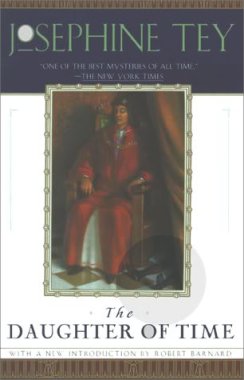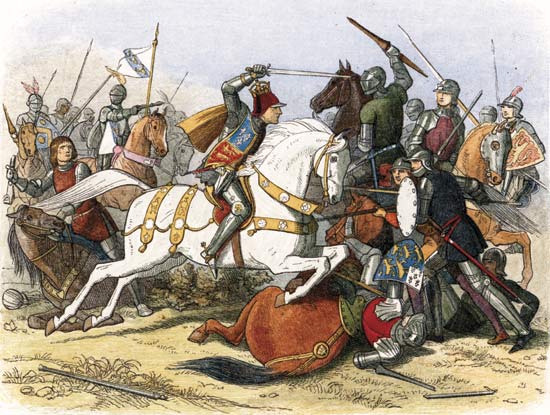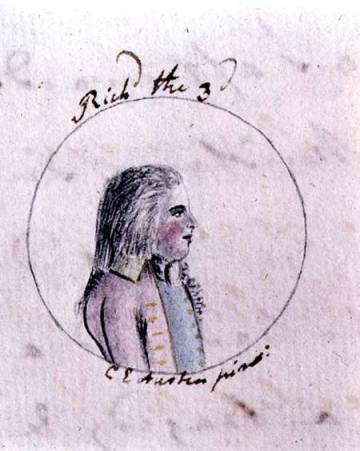Richard III has been getting much-needed attention these past few days – his Bones, it seems, have been languishing beneath a parking lot …
About 22 years ago on a trip to Scotland with the Appalachian Mountain Club, we stayed in Beauly not far from Inverness in a Castle called Aigas (now the Aigas Field Centre), hosted by Sir John Lister-Kaye and his Lady Lucy. We spent our days studying the flora, fauna, and geology of the surrounding area, a glorious adventure, as you can imagine – but one of the most memorable parts of the trip was meeting another guest staying at the Castle – he was not part of our group, but came there every year to go birding, an elderly gentleman blessed with a brilliant mind and great charm – his one great obsession other than birds was Richard III, and from him I learned about the Richard III Society. He went off into spasms of ecstasy telling of his also annual treks to Bosworth where he could hear the “swish, swish” of the swords on the field where Richard was slain in 1485.
Illustration depicting the Battle of Bosworth Field, with King Richard III on the white horse.
I came home with my own obsession with the long-dead Richard – read everything I could find on him, beginning with Josephine Tey’s The Daughter of Time, her tribute to Richard [she was a staunch member of the Society] and the clear statement of her belief in his innocence. Shakespeare had done the young King a dirty deed it seems, maligned forever in History as the murderer of the Princes in the Tower and various other souls including his Wife, and perpetrator of all manner of other nefarious politically-induced deeds…
I confess to having forgotten more than I ever actually knew about RIII, and now other than Shakespeare and Tey, he has largely fallen off my radar, or at least I no longer need to get into discussions with everyone I meet in a rabid defense of his innocence… but I am excited about his Bones being found and restored to a rightful burial place at Leicester Cathedral; this discovery shall certainly bring on a re-assessment of who he might really have been…
Which brings us to Jane Austen:
Austen, as avid readers know, had an aversion to the name of “Richard”: let’s recall her first paragraph in Northanger Abbey, where she denigrates Catherine’s father so:
Her father was a clergyman, without being neglected, or poor, and a very respectable man, though his name was Richard …
And later in a 1796 letter to her sister, she remarks on Mr. Richard Harvey’s match being put off, “till he has got a better Christian name, of which he has great Hopes.” [Letters, p. 10]
And famously in Persuasion, and one of the nastiest comments in all her novels, on poor Dick Musgrove:
The real circumstances of this pathetic piece of family history were, that the Musgroves had had the ill fortune of a very troublesome, hopeless son, and the good fortune to lose him before he reached his twentieth year; that he had been sent to sea, because he was stupid and unmanageable on shore; that he had been very little cared for at any time by his family, though quite as much as he deserved; seldom heard of, and scarcely at all regretted, when the intelligence of his death abroad had worked its way to Uppercross, two years before.
He had, in fact, though his sisters were now doing all they could for him, by calling him “poor Richard,” been nothing better than a thick-headed, unfeeling, unprofitable Dick Musgrove, who had never done any thing to entitle himself to more than the abbreviation of his name, living or dead. [Persuasion v. I, ch. VI]
Ouch!
No one has ever satisfactorily explained this aversion of Austen’s to the name ‘Richard’ – one could certainly explain it as her disliking Richard III with such a passion that anyone named Richard should suffer her admonition; but here is what she says about Richard in her History of England, with such a contradictory tone, one does not quite know what she really thought [forever the illusive Jane] – but on the whole I think she believes him to be mistreated by History – perhaps she would have been a reigning member of the Richard III Society!
Richard the 3d
The Character of this Prince has been in general very severely treated by Historians, but as he was a York, I am rather inclined to suppose him a very respectable Man. It has indeed been confidently asserted that he killed his two Nephews & his Wife, but it has also been declared that he did not kill his two Nephews, which I am inclined to beleive true; & if this is the case, it may also be affirmed that he did not kill his Wife, for if Perkin Warbeck was really the Duke of York, why might not Lambert Simnel be the Widow of Richard. Whether innocent or guilty, he did not reign long in peace, for Henry Tudor E. of Richmond as great a villain as ever lived, made a great fuss about getting the Crown & having killed the King at the battle of Bosworth, he succeeded to it.
***********
You can read Austen’s complete History of England here at the British Library, and here at Jane Austen’s Fiction Manuscripts , both in the original edition and facsimile.
So what do you think? Should Richard III be exonerated of his dastardly deeds? Should we do as Jane did and be “rather inclined to suppose him a very respectable Man”? I will just say that may Richard at least from henceforth Rest in Peace…
[Richard III Memorial in Leicester Cathedral]
And I must add this final image sent just this morning from a friend – only the English can get away with this sort of thing, but I laughed ‘til tears came… somehow I think Jane Austen would be laughing too…
Further reading:
- Christopher Sandrawich wrote a post on this blog last year on viewing Shakespeare’s Richard III at the Swan Theatre
- The Telegraph.uk with video of the findings
- Beautiful Beauly, Scotland at wikipedia
- Bosworth Battlefield website
- Battle of Bosworth Field at Wikipedia
- Jospehine Tey and The Daughter of Time at the RIII Society
 [like Jane Austen, Tey wrote just over a handful of novels – read them!]
[like Jane Austen, Tey wrote just over a handful of novels – read them!]









…and you have probably already seen his reconstructed image everywhere by now, but in case not: http://news.nationalgeographic.com/news/2013/13/130205-richardiii-english-king-3d-reconstruction-science-archaeology/
(and count me as another Tey fan and former Ricardian)
LikeLike
Hello Hope – yes I saw this image, I found it a tad creepy to be honest! – I think he looks more like King Tut! Thank you for this National Geographic article, another to add to the collection – there are almost as many articles on Richard III this week as there were on Jane Austen’s Pride and Prejudice last week!
LikeLike
Jane Austen and Richard III:-
Michael Ibsen, the man whose DNA was tested alongside Richard III’s to confirm that they were related, has an unbroken female pedigree from his mother back to Richard’s mother, Cecily Neville. Cecily wasn’t Jane Austen’s direct ancestor, but she was her 11th-great-aunt. Cecily’s sister Eleanor Neville and her husband Henry Percy, 1st Earl of Northumberland, were Jane’s 10th-great-grandparents. (And yes, in case you are wondering, Hotspur was another of Jane’s direct ancestors.)
Ron
LikeLike
I am a very slow thinker. I wonder why no DNA samples were taken from the remains of any of Richard’s brothers for comparison. His brother George, Duke of Clarence (who “died by drowning in a butt of Malmsey wine”) was buried in Tewkesbury Abbey, and it looks like he’s still there. It’s possible that the resting places of George’s sons are known, too. More to the point, his brother King Edward IV was buried at St George’s Chapel, Windsor.
LikeLike
I agree with you on your last sentence. I believe Jane would be laughing, too. I certainly did:)
LikeLike
Indeed, I think she would be – and also quite pleased with all the attention he is getting!
LikeLike
Deb, you surprise me!! I didn’t think that you had such a great interest in Richard III..
There was a Channel 4 documentary about the research that went into proving the skeleton was Richard III. It was a fascinating crime scene investigation. The chap from the Royal Armouries, an expert on medieval warfare and weapons, after close examination of, in particular Riichard’s skull, was able to tell the story of his last moments. Those medieval soldiers were butchers!!! There was a hole drilled through the top of his skull. One person must have used his weight to force the thin dagger blade down. A poleaxe was used to remove the base of his skull at the back of his head and probably spilled his brains. A diagonal slice was taken out of the top of his skull by a
sideways sweep of a sword and to add insult to injury, once stripped of his armour and flung over a horse, some vindictive brute stabbed him very forcefully up the arse. The base of his spine had a deep groove in it, splitting the bone, caused by a heavy sharp weapon.Thus were the ways of hand to hand medieval warfare, all done in the name of Jesus Christ. These monarchs thought they had a God given right to rule until they were smote dead upon the battle field. It was at that moment they realised that God had changed his alleigence and their number was up. I hope I haven’t put you off your tea.
I take it Deb, you haven’t got the same liking for Alexander Pope, Jonathen Swift, Pete Townsend and all things Richmond. You should have told me.Ha! Ha!
All the best, Tony
LikeLike
Well, I am “off my tea” a bit as you say! – thank you [I think!] for the brutal re-telling. One forgets in all this that he was only 32 at the time of his death…
Thanks as always Tony for your input…
deb
LikeLike
Yikes – brutal death. I read Tey’s Daughter of Time some years ago and must say my sympathy has been with Richard 3 since then. I have been intrigued with all the recent news.
LikeLike
I confess that I’m slowly becoming a Richardian as well. Or even not so slowly:) Even since I have read my first historcial fiction book on the Cousins’ War the character of Richard III has intrigued me greatly. I don’t think he was a saint, but I highly doubt that he murdered his nephews or his wife. A person who went into exile with his older brother, King Edward IV, who fought at his brother’s side and supported him, without betraying, who was loved by people of the lands bestowed to him, proves that for a medieval noble Richard III was a just and prudent ruler who could not have his personality twisted so drastically as to go and kill his relatives in order to get a throne or new wife after the death of his brother. Well, that’s my humble opinion based on limited number of read historical books and articles as well as personal preferences and intuition:) So I may be wrong, though I hope I’m not.
And I would say: Not guilty!
LikeLike
Oloore,, one thing we must remember in all this. British Monarchs,in the Medieval period were tyrants who would stoop to any depths to hold power and . they ruled by the sword. I would not feel romantic about any of them. You certainly would not like them if you met one , Richard III definitely included, and they would not even look at you or me.We would be trampled underfoot and crushed into the ground. Richard would have been capable of anything.. He thought he had a direct link to god allowing him do anything he pleased, kill his wife murder his nephews and rule fairly and justly all in the same mix. He had a divine rite.. Our world bankers have the same mentality. They think they have a divine right too. i wonder how many people they have destroyed in their pursuit of power and influence. . The pursuit of power is a destructive and evil drug.
LikeLike
I agree with you Tony to a point – I believe that there are just people in the world, Kings among them – Richard lived in a brutal time and brutality was the order of the day – kill or be killed – who knows what really went on. If you read the Hilary Mantel books on Thomas Cromwell, he is so humanized, that one can easily forget the record as we know it of an ambitious and ruthless man – what is the truth?? – I am studying Macbeth at the moment for a class [[what! – a class NOT on Jane Austen??] – all based on the truth of blatant dastardly doings among kings and soldiers and ambitious wives. “Power corrupts; absolute power corrupts absolutely” as they say, is the human condition, the Divine Right of Kings is still rampant in places – we hope better in the “civilized” world but I get more cynical with each daily read of the papers – just not quite as cynical as you Tony! I agree we should not romanticize Richard, but we can at least re-assess the record with new evidence as found and de-monster him just a tad…
LikeLike
Deb, may I set your mind at ease – King Duncan I of Scotland, who was murdered by his cousin Macbeth in 1040, was Jane Austen’s 21st-great-grandfather.
LikeLike
Thank you Ron, for yet another instance where ALL in life that one thinks or does comes back to Jane Austen! – my caro sposo is rolling his eyes as I speak!
But REALLY? – how exciting that the poorly-done-to Duncan was such a close connection – can you outline that for me and write something about it? – she wouldn’t have known of course or certainly he would have made it into her “History”!
Thank you for this!
Deb
LikeLike
I love it! My own dear wife has perfected her eye-rolling, too.
LikeLike
To Tony – indeed I’m inclined to romanticize Richard III, even though I know very little of his real deeds and even less about his real intentions and thoughts. And I agree that to all kings, nobles and bankers in middle ages and nowadays we are just peasants, sometimes not worth being stepped on:))) But still there were and are different types of tyrants, monarchs and rulers. They all have the same power over their subjects, but they still use it differently and in different directions. I’m not inclined to romanticize just any English king or queen, though I think that any of them could say something in their defense (refer to some family trauma or hurt feeling). It is just that Richard III is very good material for romantization: very controversial, with certain grounds for doubting certain bad things said about him, and now with mystery about his burrial being reveiled. And when there is large group of people who blame a person of grave sins and large group of people who claim this person to be innocent, I personally think that such center of attention is an interesting character, worth of being researched more:)
LikeLike
Warfare is a fascinating subject. Despite the dubious morality of using violence to achieve personal or political aims. It remains that conflict has been used to do just that throughout recorded history.
Your article is very well done, a good read.
LikeLike
Hi Deb! Check out this post I wrote before Googling and finding your above blog post — I do believe I have the answer, it is indeed all about Richard III…. The “frightening” reason for Jane Austen’s mysterious antipathy for the name Richard
http://tinyurl.com/hnhhmrw
LikeLike